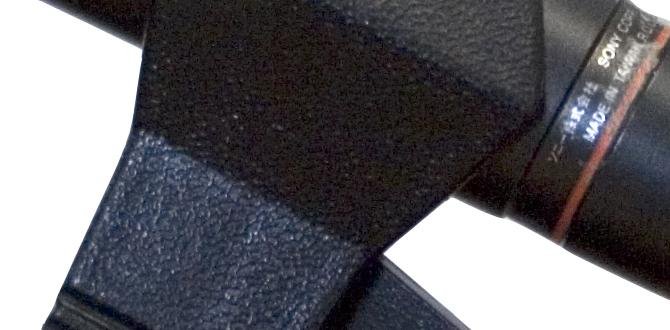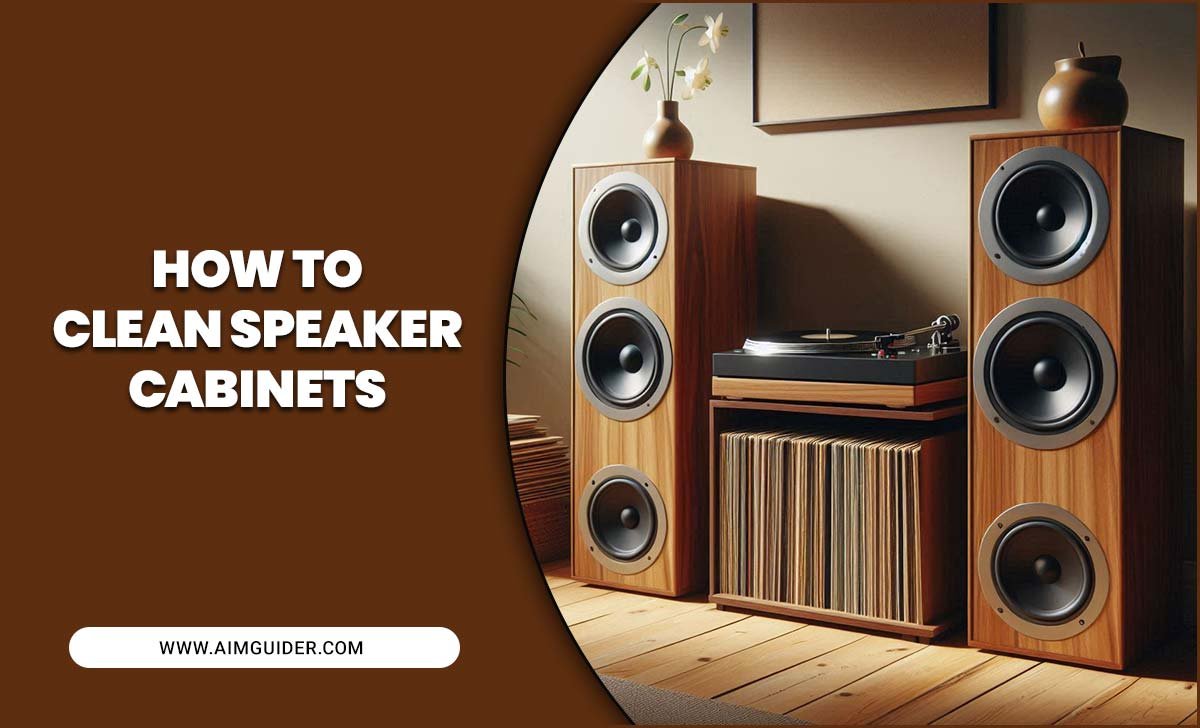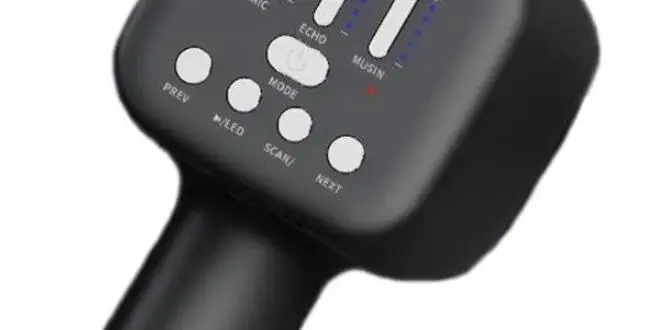The right microphone for singing in church can make a big difference. Have you ever listened to a choir or soloist and felt moved by their voice? A good microphone helps capture that magic. Without it, even the best singers can sound flat or distant.
Imagine standing in a packed church, the lights dimmed, and the crowd waiting in silence. The singer steps up, but their voice can barely be heard. Frustrating, isn’t it? Everyone deserves to hear the beautiful messages in songs during worship.
Choosing the right microphone for singing is essential. You want something that picks up every note clearly. Did you know that some microphones can even block out background noise? This feature can help focus on the singer’s voice more than the sounds around them. That’s what makes a great sound experience during church services.
In this article, we will explore different types of microphones for singing. We will also discuss how to choose the best one for your church’s sound needs. Whether you’re part of the choir or a solo performer, the right microphone can help make your performance unforgettable.
Best Microphone For Singing For Church Sound Setup

Microphone for Singing for Church Sound
Choosing the right microphone for singing in church can make your worship experience amazing. Did you know that a good microphone can capture every note clearly? It helps everyone hear your voice well. Consider how a quality mic can reduce background noise. Common types include handheld and lapel mics. Each has its perks! So, what will you pick for your next church performance? A great microphone can truly enhance your singing!Understanding the Importance of Microphones in Church Settings
Role of microphones in enhancing vocal clarity. Impact on worship experiences and congregation engagement.Microphones play a big role in church settings. They help everyone hear the singers clearly. Clear vocals make worship more enjoyable. Without good microphones, many people might miss important moments. This can lead to less engagement in the service. A great sound system creates a better atmosphere for everyone. Here are some key points about the importance of microphones:
- Enhances vocal clarity for better understanding.
- Improves worship experiences by making songs more uplifting.
- Increases congregation engagement as people feel more included.
Why are microphones important in church?
Microphones are vital for clear communication and participation in worship. They ensure everyone hears messages and songs, making the service more powerful and engaging.
Types of Microphones Suitable for Singing
Dynamic microphones: features and benefits. Condenser microphones: when to use them in church settings.There are two common types of microphones you’ll find for singing in church: dynamic and condenser. Dynamic microphones are like the superheroes of sound; they’re tough and handle loud voices well. They work great with loud instruments and won’t pick up all that unwanted noise. On the other hand, condenser microphones are more sensitive and capture the warmth of the voice beautifully. Use them when your church needs soft, sweet melodies—like during a solo performance. They’re like the gentle giants of the audio world!
| Microphone Type | Features | Best Use |
|---|---|---|
| Dynamic | Durable, handles high volume | Loud environments, group singing |
| Condenser | Sensitive, captures detail | Soft vocals, solo performances |
Key Features to Look for in Church Microphones
Frequency response and sound quality considerations. Durability and design: handling wear and tear.Choosing a microphone for church singing involves two big deals: sound quality and how tough it is! First up, frequency response matters. You want a mic that captures every note, making your voice sound fantastic. Next, think about durability. Church life can be rough on equipment, so pick a microphone designed to handle bumps without losing its shine. A good microphone should keep singing beautifully, even after a few accidental drops during hymn practice!
| Feature | Importance |
|---|---|
| Frequency Response | Captures full range of sound |
| Durability | Withstands church wear and tear |
Wired vs. Wireless Microphones: Pros and Cons
Advantages of wired microphones in church setups. Benefits of wireless microphones for mobility during services.Microphones come in two flavors: wired and wireless. Each has its perks. Wired microphones are often sturdy and reliable. They won’t run out of battery, so no sudden silences during worship! They’re perfect for fixed setups in churches. On the flip side, wireless microphones offer freedom. Singers can roam freely, engaging the audience without tripping over cords. This mobility can make services much more lively. Here’s a quick look at their pros and cons:
| Microphone Type | Advantages | Disadvantages |
|---|---|---|
| Wired | Reliable, no batteries needed | Cords can be tripping hazards |
| Wireless | Freedom to move, easy setup | Battery can die, signal issues |
Deciding between them? It’s like choosing between cake and ice cream—both are great, but it depends on the occasion!
Microphone Placement Tips for Optimal Sound
Best practices for positioning live microphones. Techniques to minimize feedback in church acoustics.Position your microphone about 6 to 12 inches from your mouth. This distance helps capture your voice clearly and stops it from sounding like you are speaking from a cave! Want to avoid that annoying feedback noise? angle the microphone away from speakers. It’s like playing dodgeball with sound waves! Also, keep an eye on church acoustics. Soft materials like curtains can soak up sound, while hard surfaces can reflect it. So, adjust accordingly for the best worship experience!
| Microphone Technique | Purpose |
|---|---|
| Distance | Minimizes echo and captures clear voice |
| Angling | Reduces feedback and improves sound quality |
| Consider Surroundings | Affects sound reflection and absorption |
Budgeting for Church Microphone Systems
Costeffective options without compromising quality. Fundraising strategies to upgrade church sound systems.Finding good microphones for a church doesn’t have to be expensive. Look for cost-effective options that still deliver great sound. Consider brands known for quality without the high price tag. Explore fundraising strategies to upgrade your system. This could include community events or donation drives. Every little bit helps!
What are some budget-friendly microphone options?
Look for brands that offer warranties and good customer support.!
Tips for Fundraising
- Host fun events like bake sales or auctions.
- Ask local businesses for donations.
- Set up an online crowdfunding page.
Maintenance and Care for Church Microphones
Routine cleaning and handling tips. Troubleshooting common microphone issues in church environments.Keeping church microphones in tip-top shape is as important as hitting the right notes during a Sunday service. Start with routine cleaning. Wipe the microphones with a soft cloth and avoid using chemicals that sing louder than a choir. For handling, always hold the mic by the base. This prevents strange sounds and keeps it safe from accidental drops—no one wants a microphone to take a dive during a performance!
Common issues can pop up like a surprise solo. Buzzing noises or no sound at all could mean loose cables or a dead battery. Make sure to check connections first. If you hear feedback that sounds like a cat being stepped on, it might be time to adjust the settings. Troubleshooting can save the day and keep the congregation singing!
| Issue | Fix |
|---|---|
| Buzzing | Check connections |
| No Sound | Replace battery or cable |
| Feedback | Adjust volume settings |
Conclusion
In conclusion, choosing the right microphone for singing in church is important. Look for one that suits your voice and setting. Remember to consider sound quality, ease of use, and budget. Test different options to find what feels right for you. For more tips, explore articles on microphone types and settings to improve your church sound experience!FAQs
Sure! Here Are Five Related Questions On The Topic Of Microphones For Singing In A Church Sound Environment:Sure! When you choose a microphone for singing in church, look for one that picks up sound well. A good choice is a dynamic microphone, which is strong and handles loud voices. You also want a microphone that reduces background noise so everyone can hear you clearly. Make sure it’s comfortable to hold and easy to use. Lastly, test it out before singing to see how it sounds!
Sure! Please provide the question you’d like me to answer, and I’ll do my best to help you!
What Are The Key Features To Look For In A Microphone For Live Singing In A Church Setting?When choosing a microphone for live singing in a church, look for a few important features. First, a good microphone should capture your voice clearly. It should also reduce background noise so everyone can hear you well. A strong microphone will be durable and last through many performances. Lastly, consider the microphone’s size and weight; it should be easy to hold and use.
How Do Condenser Microphones Compare To Dynamic Microphones For Vocal Performances In A Church?Condenser microphones are very good for picking up soft and clear sounds. They can capture more detail in your voice, making them great for singing. Dynamic microphones are tough and can handle loud sounds without breaking. In a church, it depends on what you need: clear voices or strong sounds. Both types can work well in different ways!
What Microphone Types Are Best Suited For Soloists Versus Choir Groups In A Church?For soloists, a handheld microphone works best. You can hold it close to your mouth, so your voice is clear. For choir groups, a large microphone or several small ones help pick up many voices. These mics can catch sounds from different directions. This way, everyone in the choir can be heard at the same time!
How Can Church Acoustics Influence The Choice Of Microphone For Singing?Church acoustics can change how sound travels in a room. If a church has a lot of echoes, you might need a special microphone that picks up voices clearly. You want to avoid loud echoes that can make singing hard to hear. For churches with less echo, simpler microphones might work just fine. Choosing the right microphone helps everyone hear the singing better!
What Are Some Recommended Microphone Brands Or Models Specifically Designed For Church Use?For church use, some good microphone brands are Shure, Sennheiser, and Audio-Technica. The Shure SM58 is great for singing. The Sennheiser EW series is perfect for speakers. Audio-Technica’s AT2020 works well for recording. These microphones help everyone hear clearly during services.








